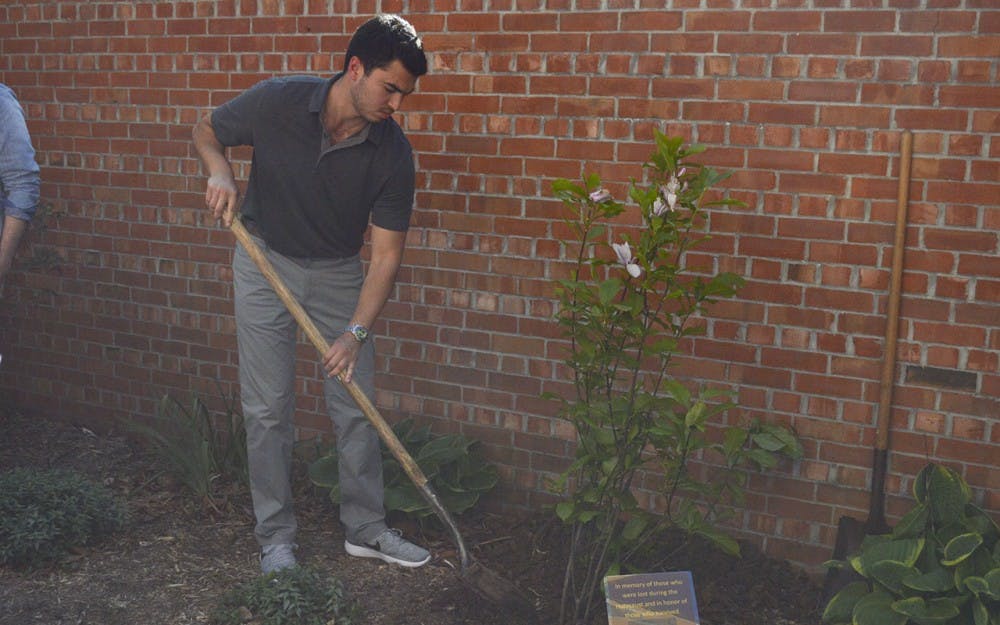In Israel, a siren sounded at 11 a.m. Monday, and the streets went silent. Traffic stopped. Theaters, pubs and restaurants closed, and candles were lit.
In Bloomington, community members — Jews and non-Jews alike — gathered at the Helene G. Simon Hillel Center and walked to Sample Gates in silence.
The silent procession was part of the program for Yom HaShoah Ve-Hagevurah or Holocaust Remembrance Day, at the Hillel Center. The evening included a tree-planting ceremony; a lecture by Gunther Jikeli, scholar at the Institute for the Study of Contemporary Antisemitism; and a panel of Holocaust survivors.
“It’s so important to us that we share their stories and understand them from generation to generation,” said Sue Silberberg, rabbi and director of Hillel. “We want to give honor to those who perished.”
Attendees first gathered in the garden, where a hole had been dug into the dirt and a shovel was propped up against a red brick wall lining the perimeter of Hillel. The community members chatted to one another until someone shushed the crowd, and the group went silent.
A volunteer pulled the maple tree out of a pot, dropped it into the hole and buried it with dirt from the mound beside him. A pinkish-white petal fell from the tree and fluttered to the ground below before the crowd began to sing the Hebrew song “Eli, Eli.”
“My God, My God, I pray that these things never end,” the crowd sang. “The sand and the sea, the rush of the waters, the crash of the heavens, the prayer of the heart.”
The song and the tree were a means of remembering the past while capturing hopes for the future of the Jewish people, Silberberg said. While she wants Jews to always move forward, she said this is only possible if they remember their past.
“We want to remember the past but know that the future continues,” she said. “Life grows and continues like a tree would.”
As the song ended, attendees ascended the stairs to a gathering room where Jikeli sat in front beside three Holocaust survivors — Naum Kolotinskiy, Sonya Shulkin and Era Solyar.
“I admire your strength to speak out about your personal experience with the Holocaust and what you saw with your own eyes,” Jikeli said to the survivors.
Jikeli said words often seem inadequate to describe the monstrosity of the Holocaust, but hearing the stories of survivors can help people begin to understand.
“We must prevent the words ‘never again’ from becoming meaningless,” Jikeli said.
After Jikeli spoke, six IU students lit six candles in memory of the six million Jews who died in the Holocaust. Then the students lined up in front of the audience and recited a chant.
“The human spirit is the light of God,” they said in unison. “As we look at these lights, try to imagine six million candles, each one with the name of another human being who was murdered in the Holocaust.”
As a child of a lawyer and economist, Solyar, whose granddaughter is an IU student, lived a comfortable life in Kiev, Ukraine. When the war started, her father went to fight in the army, and she evacuated to the North Caucus region with her mother, younger brother and grandmother.
During the trek to the North Caucus, Solyar was starving and had no water. She watched as people around her contracted malaria and died. She smelled dead bodies every day.
“People were carrying little babies,” she said. “Some people just dropped and died right on the way.”
Shortly after arriving at a hospital, Solyar’s mother, brother and grandmother died on the floor where there were no beds left for them.
“I can’t talk too much about this,” she said with her hand on her chest. “It was a miracle that I survived.”
Solyar said she thought she was an orphan until her father found her and brought her back to an army base in Stalingrad, Russia. In Stalingrad, she survived on the meager food rations her father could bring her.
After the war, she returned to Kiev with her father, only to find their apartment empty and all their belongings stolen by the Germans.
“I’ve never told anyone this story in my whole life while in Ukraine,” she said “Now, you guys have to know so that it doesn’t become a reality.”
IU senior Casey Stover said while the perpetrators caused the Holocaust, it was the people who stood by silently who allowed it to happen. She said it’s important to learn from stories of the Holocaust so that people can prevent it from happening again.
“There’s still hatred and ignorance and violence in the world today,” Stover said. “It’s important to be aware and not deny it so that we can face it together.”
Solyar said she urges Jews today never to be bystanders, to always watch out for anti-Semitism and never to forget that they are Jewish.
“No matter what, stay true to the fact that you are Jewish,” she said. “Judaism should not be something you shy away from.”






